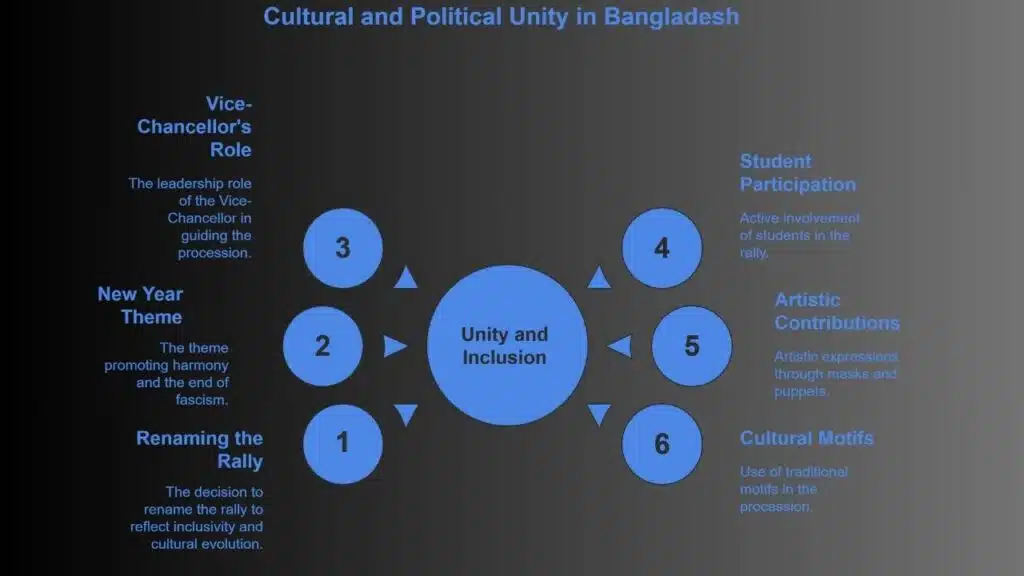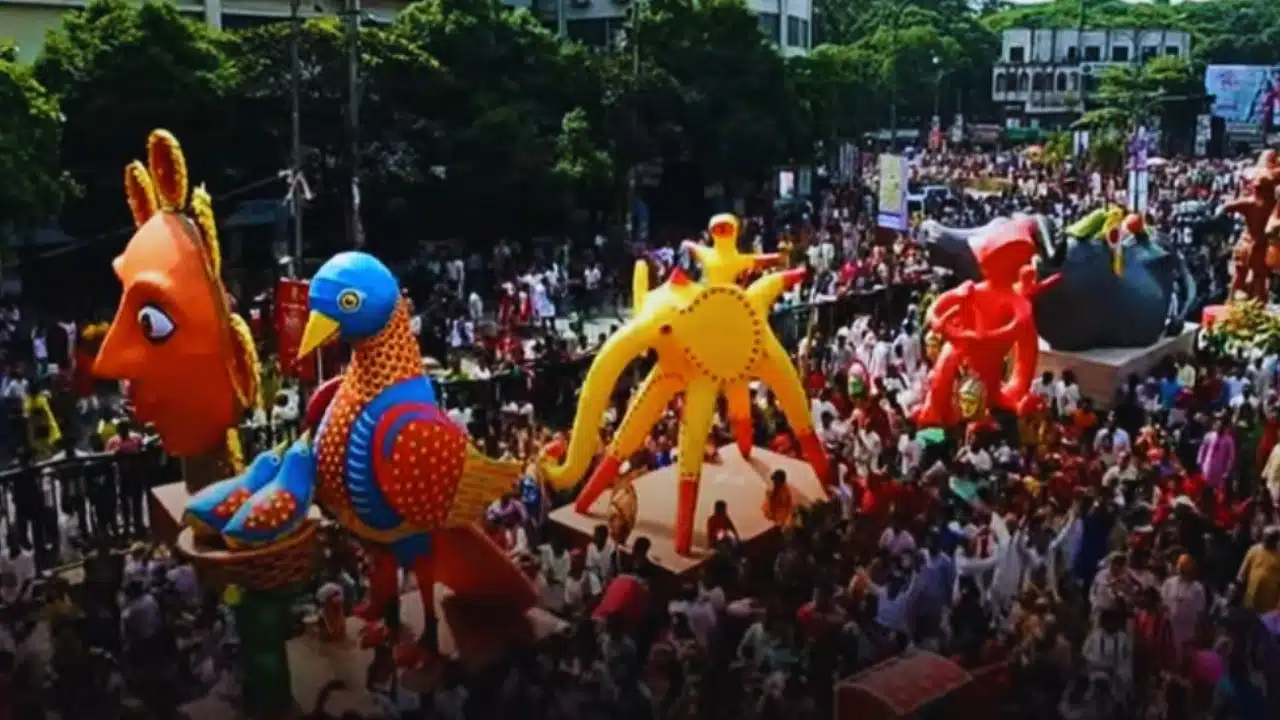Today, Monday, April 14, Bangladesh is embracing Pohela Boishakh 1432, the first day of the Bengali New Year, with nationwide celebration, cultural renewal, and a vibrant display of unity. As a festival deeply rooted in the heritage of the Bengali people, Pohela Boishakh transcends religious, ethnic, and social lines to unite the entire nation in a shared expression of identity and hope for the future.
People from all walks of life—young and old, urban and rural—have gathered in streets, parks, educational campuses, and public squares to join Baishakhi rallies, traditional music performances, art exhibitions, and fairs (melas) celebrating Bengali food, crafts, and community spirit.
The government, civil society organizations, educational institutions, and media outlets have joined hands to orchestrate an elaborate series of programs under the banner of national heritage, cultural resilience, and social harmony.
Renaming the Traditional Dhaka University Rally: A Bold Statement of Inclusion

One of the focal points of today’s festivities is the iconic procession by the Faculty of Fine Arts at Dhaka University, previously known as “Mangal Shobhajatra”. This year, the symbolic rally has been officially renamed “Barshoboron Ananda Shobhajatra” (Joyous Procession Welcoming the New Year), a move that sparked conversations about the evolving cultural landscape of Bangladesh.
The decision was confirmed at a press briefing held on Friday, where officials announced the new name while reaffirming the procession’s symbolic role in upholding secularism, resistance to oppression, and cultural diversity.
Theme for 1432: ‘Noboborshe Oikotaan, Fascibader Obosaan’
This year’s procession is being held under the powerful theme:
“Noboborshe Oikotaan, Fascibader Obosaan”
(Harmony in the New Year, End of Fascism)
Chaired by Vice-Chancellor Professor Neaz Ahmed, the organizing committee emphasized that the theme encourages a collective rejection of authoritarianism, political intolerance, and societal division, while calling for inclusion, dialogue, and peace. Students, artists, and activists from across the country have participated in the procession, adorned with vibrant masks, giant puppets, and traditional motifs, marching to the beat of drums (dhol) and folk music.
Dawn at Ramna Batamul: Chhayanaut’s Soulful Tribute to Light and Liberation
The prestigious cultural group Chhayanaut once again hosted its annual Pohela Boishakh celebration at Ramna Batamul, one of the most spiritually resonant and iconic events of the Bengali calendar. Now in its 58th edition, the theme for 1432 is “Amar Mukti Aloy Aloy” (My Liberation in Light), a poetic reflection on resilience, freedom, and the enduring power of culture in shaping a better society.
The event began at sunrise, as thousands of people, dressed in red and white traditional attire, gathered beneath the sprawling trees of Ramna Park to welcome the New Year with music, poetry, and hope.
Highlights of the Program:
- Raag Bhairavi opened the event, invoking peace and reverence.
- 24 performances included:
- 9 group musical presentations
- 12 solo renditions of classical and folk songs
- 3 poetry recitations featuring the works of Rabindranath Tagore, Kazi Nazrul Islam, and Jibanananda Das.
For the first time, the full event is being broadcast live on Chhayanaut’s YouTube, Facebook page, and Bangladesh Television (BTV), allowing viewers both in Bangladesh and abroad to take part in the spiritual celebration of cultural pride.
Messages of Peace and Togetherness from National Leaders
The festive spirit of Pohela Boishakh was echoed in heartfelt messages from various political and social leaders. Nobel Peace Laureate Prof. Muhammad Yunus, speaking at the foundation ceremony of Sampriti Bhaban at the Dhaka International Buddhist Monastery, stressed the importance of communal harmony and shared identity.
He remarked:
“Pohela Boishakh reminds us that regardless of our religious beliefs, we all share the same cultural heritage. Muslims, Hindus, Buddhists, Christians, and ethnic groups from across the plains and hills are members of one family.”
His message was a powerful reaffirmation of Bangladesh’s inclusive cultural identity at a time when regional and global tensions are affecting multicultural societies.
BNP’s Messages of Optimism and National Unity
Leaders from the Bangladesh Nationalist Party (BNP) also extended their greetings:
- Tarique Rahman, Acting Chairman, expressed hopes that the New Year would ignite “renewed aspirations” and rid the nation of “falsehood, injustice, lawlessness, and unrest.”
- Mirza Fakhrul Islam Alamgir, BNP Secretary General, called Pohela Boishakh a symbol of unity:
“This is a time when personal divisions are set aside, and hearts are filled with collective hope.”
Celebrations Beyond the Capital: A Festival for All
Across Bangladesh—from Rangpur to Barishal, Sylhet to Chattogram—a wide range of Baishakhi events, street festivals, cultural contests, and fairs are being held in schools, colleges, and public parks. Celebrations include:
- Folk music and dance
- Traditional Bengali cuisine stalls offering panta ilish, shutki bhuna, and chitol macher muitha
- Art installations promoting heritage and sustainability
- Children’s painting and poem competitions
In rural areas, shopkeepers and businesses are observing the Halkhata ceremony, a centuries-old tradition of opening new accounting ledgers. Customers are greeted with mishti (sweets) and welcomed with blessings for prosperity in the new year.
Media and Cultural Coverage in Full Swing
The nation’s media is also playing a significant role in highlighting the significance of Pohela Boishakh:
- National newspapers have released colorful supplements filled with editorials, poems, essays, and festival history.
- Bangladesh Betar (state radio) is airing traditional Baul music and interviews with historians and artists.
- Private TV channels and streaming platforms are hosting live concerts, documentaries, and retrospectives on the evolution of Bengali New Year celebrations since the Mughal and colonial periods.
Ensuring a Safe and Peaceful Celebration
To manage large gatherings and ensure public safety, the government has rolled out a comprehensive security plan nationwide. Rapid Action Battalion (RAB) and Dhaka Metropolitan Police (DMP) are monitoring celebration zones with:
- Special female security units
- Undercover agents to prevent harassment
- Mobile courts to address disturbances on the spot
- Drone surveillance in urban areas like Dhaka, Rajshahi, and Khulna
RAB Director General Shahidur Rahman assured the public that law enforcement is on high alert to prevent extremist activities and any disruption of the peaceful observance. Awareness campaigns have also been launched to encourage respectful behavior in public places.
A New Year, A New Chapter of Hope
As the day progresses, the streets remain filled with smiling faces, cultural songs echo from loudspeakers, and the smell of traditional dishes wafts through neighborhoods. Pohela Boishakh is more than just a date on the calendar—it is a reminder of resilience, pride, and the strength of unity in diversity.
In a world increasingly marked by division and disconnection, Bangladesh’s collective embrace of Pohela Boishakh 1432 serves as a testament to the enduring power of culture to connect people, renew hope, and inspire a better tomorrow.


































